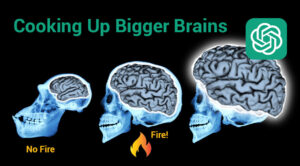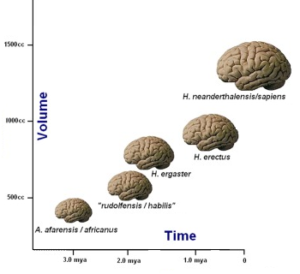 Cooking up bigger brains has happened before in our evolution. In a big way.
Cooking up bigger brains has happened before in our evolution. In a big way.
The invention of cooking food marked a significant milestone in human evolution, increasing the brain size and cognitive abilities of early hominids. As we now venture into the world of AI language models like ChatGPT, can we draw parallels with this transformative development? In this blog post, we explore whether integrating AI technology—specifically ChatGPT—into our lives could have a similar effect on human cognition.
According to anthropologist Richard Wrangham,
“The secret to our evolution is cooking. Our hominid ancestors could never have eaten enough raw food to support our large, calorie-hungry brains.”
Our brain size increased by 3x over the earlier hominins.
 Humans are believed to have started cooking food with fire around 1-2 million years ago, during the time of Homo erectus. This development is significant as it not only improved flavor, texture, and safety, but also made the food more digestible and nutrient-rich.
Humans are believed to have started cooking food with fire around 1-2 million years ago, during the time of Homo erectus. This development is significant as it not only improved flavor, texture, and safety, but also made the food more digestible and nutrient-rich.
Can ChatGPT Enable Us to Surpass the Theoretical 10% Brain Utilization Threshold?
It is difficult to directly correlate the use of ChatGPT or similar AI models with an increase in human brain size or capacity. However, integrating AI technology like ChatGPT into our lives could indirectly contribute to enhancing cognitive abilities in various aspects.
 Here are six ways we predict AI models can and will improve human brains:
Here are six ways we predict AI models can and will improve human brains:
1. Expediting Knowledge Acquisition
One of the most significant benefits of ChatGPT lies in its capacity to supplement our knowledge. By processing vast amounts of data from diverse sources, it can generate insightful responses on a multitude of topics, from academic subjects to everyday queries. This allows it to function as an accessible, on-demand learning resource.
2. Enabling Cognitive outsourcing
AI can take over a variety of tasks, ranging from scheduling appointments to drafting initial versions of lengthy reports, from translating languages to answering factual questions. By handling such cognitive tasks, ChatGPT releases our mental capacity and time, allowing us to focus on more complex, creative, and valuable undertakings. This unique ability to outsource ‘thinking’ tasks to AI fundamentally changes the way we approach problem-solving and productivity.
3. Facilitating Collaborative Learning
ChatGPT isn’t just a tool you passively use: it’s a partner you actively engage with. Users can pose problems, push its limits, and question its outputs. This interactive, dynamic AI-user relationship fosters a learning setting where humans and AI can grow together. It helps expose our blind spots in understanding, summons curiosity, and cultivates an appetite for deep learning.
4. Bridging Skill Gaps
From aiding programming to assisting language learning, and playing chess to simulating business scenarios, AI models can assist users in upskilling in a customized, targeted manner. Its adaptable interface can provide tailored support for each user’s needs, enabling quick and effective skill acquisition.
5. Uncover New Perspectives
AI models can analyze complex data and generate insights we might not come up with independently, providing fresh perspectives for problem-solving and decision-making.
6. Reduce Cognitive Loads
Certain cognitive tasks can be outsourced to AI, allowing us to focus on other areas requiring human intelligence, thereby reducing cognitive burden and potentially increasing productivity and creativity.
Embracing the Future – Evolving Into Smarter Beings
While these factors might contribute to improved cognitive abilities or an enhanced capacity for learning and problem-solving, it’s important to recognize that the human brain is a complex organ with multiple factors contributing to its growth, development, and function.
While AI models can undeniably contribute in expanding our cognitive capabilities, an important takeaway is to always strive for a partnership, utilizing AI as a tool that aids and enriches human cognition, rather than something that replaces it. By using AI as a cognitive enhancer, we can unlock new potential in problem-solving, creativity, and learning, pushing the boundaries of human intelligence to new levels.